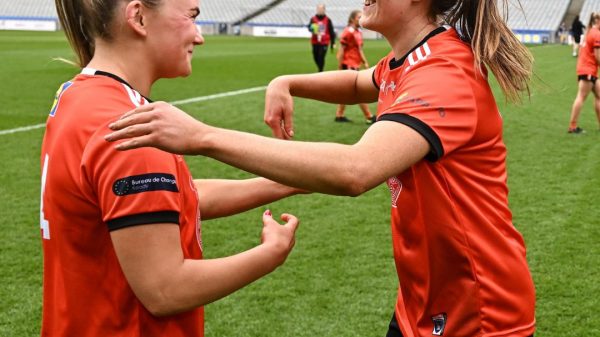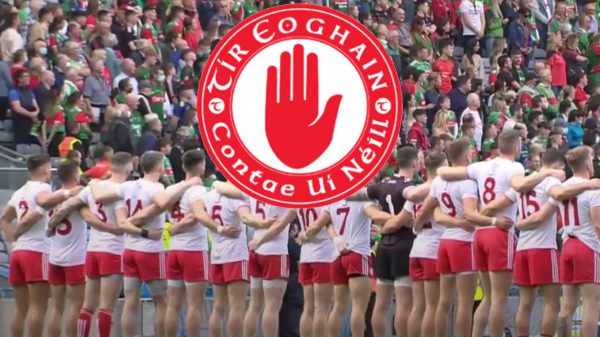Conor Meyler is a vital cog in the Tyrone footballing machine, but he is also a primary school teacher specialising in physical education.
On his LinkedIn page, he released a piece discussing his thoughts on how we must use positive language with children when talking about the Covid-19 challenge.
The Omagh man’s mother is “working as a nurse in an Intensive care unit for COVID-19 patients, I understand it’s a frightening time”, and clearly he has put thought into the following words.
BACK TO BASICS
By Conor Meyler
Have a think, what were you worried about one month ago?
Was it work you had due? A fallout with a friend? Or maybe an event you had coming up?
What was a big worry a month ago, now seems quite insignificant. Life moves on and our priorities quickly change.
Grabbing our attention and causing worry at the moment is COVID-19. The number one topic of discussion for most people. We have so much information coming at us from so many angles, with one expert advising this, and another one advising something different. Yet what they all agree on is, that this is a crisis. As Boris Johnston described it in a press conference, ‘a catastrophe’.
Catastrophe – ‘a sudden event that causes very great trouble or destruction’. Indeed, this event could be looked upon as a catastrophe.
Or, we could see it as a challenge.
Nobody wished this situation upon us. This moment is not your life, but it is a moment in your life.
Now, before I go any further and you think, ‘How can he dull this situation down and call it a challenge’ I do understand the severity of this disease and how much damage it is causing some families. You might be reading this and know someone who is ill with the virus themselves. With a mother working as a nurse in an Intensive care unit for COVID-19 patients, I understand it’s a frightening time.
Although frightening, the language we choose to use throughout this situation will alter our way of thinking. Instead of using words such as catastrophe, why not use the term challenge. Each and every one of us are now going through some form of a challenge.
A difficult challenge yes, one in which we have very little control over other than adhering to the government guidelines of staying at home and keeping our distance.
Although we can’t control what has happened, we can control our response to it.
As a teacher, every day I task my children with overcoming challenges in which we control. ‘Here is the situation kids, how do you choose to respond?’ Now they face a different kind of challenge. As I can’t work face to face with the children, my use of language in our online classroom is more important now than ever.
Language is critical in how we influence others, particularly children. Like a sponge, they will soak up our words and take them as gospel, regardless of how correct it is. The language we use will give children a feeling, a feeling in which will alter their behaviour and in turn their actions. How they act during this challenge is very important to how they approach future challenges. These actions they take will continue to promote their behaviour and encourage their feelings.
So, what language do we use? We must keep it positive. At times this is tough depending on the situation, but positive reminders are so important, now more than ever.
Children will remember their COVID-19 experience for the rest of their lives. They will forget what work they completed but they will never forget how they felt during this time. I believe it’s important that children know and understand what is going on, but instead of telling children what a catastrophe this is, remind them it’s a challenge. We have to embrace the present as it, in turn, will affect our future. Not every situation we face is good, but conversely not every situation we face is bad.
Remind children of the good work people in our communities are doing, of the good work they are doing by staying at home and washing their hands regularly.
As humans we like to keep things familiar and be in control. Some children will be struggling at this time. They have become reliant on social interactions and acceptance from peers to feel good about themselves. Their sense of belonging and friendship has changed. Their sense of autonomy has taken a hit.
Let’s bring it back to Maslow’s Hierarchy of Needs. Teaching children to appreciate the basics before moving up a level.
Enjoying the basics, having dinner together, reading a book, do a jigsaw, talking about how they feel to a family member. Remind them of the support and care they have from their family. Setting small tasks and jobs, (challenges) to complete and give them a sense of accomplishment.
Sitting outside on the grass for an hour and watching the world go by with your thoughts.
Teach children to appreciate simplicity, find comfort in a challenge. Be in control of this situation and do so with positive language. If you do, when this is all over, I guarantee you will see more resilient children.
Back to basics.
Thanks for reading.





















